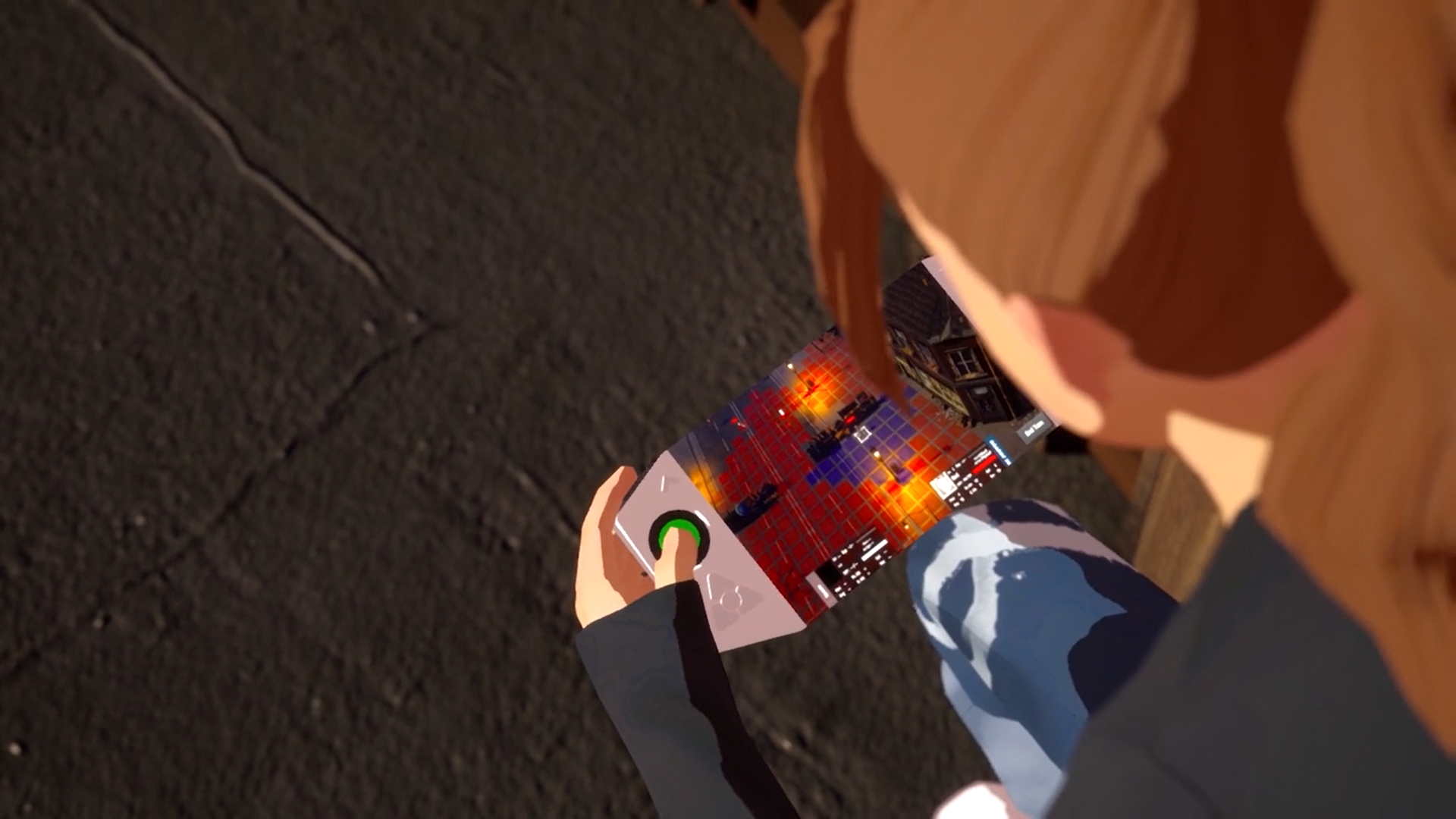 Still from Jessica Yamada’s Trailer for Roarin’2K (ANIM/CMSI 2019)
Still from Jessica Yamada’s Trailer for Roarin’2K (ANIM/CMSI 2019)
The IGI minor is a collaboration between the Frank R. Seaver College of Science & Engineering and the School of Film & Television, combining courses that focus on interactive and immersive gaming and world building—together with programming, writing, design and analysis—into one comprehensive program of study. Students gain technical and creative experience in a variety of different disciplines, making them attractive to both businesses and graduate schools that favor interdisciplinary experience in modern technologies and media. The minor can also supplement work done by students in various majors across the University interested in formal aspects of IGI in practice, as well as applications of immersive technologies in fields such as medicine, training, entertainment, and therapy, among others.
Program Goals of the Minor in Interactive, Gaming, and Immersive Media
Upon completing the program, students with a minor in Interactive, Gaming, and Immersive Media will:
- Acquire skills to expand their career options in a variety of industries.
- Expand their options for graduate study.
- Collaborate effectively in teams with diverse skills and roles spanning multiple creative and technical disciplines.
Admissions Criteria
Prerequisites as a form of admission criteria are necessary to ensure that prospective students can succeed with the challenging material. Therefore, admission to the IGI minor will only be awarded to students who have first completed the gateway courses, Computer Programming (CMSI 1010, formerly CMSI 185) and Intro to Interactive Animation (ANIM 250), with the grade of a B or better achieved in both those courses; by the review and discretion of chair of ANIM or CMSI.
Minor Coursework
The minor in IGI requires students to take a total of 6 courses, among which:
- 2 are gateway courses
- 2 are chosen from courses offered in School of Film and Television, and
- 2 are chosen from courses offered in Frank R. Seaver College of Science & Engineering.
To satisfy these requirements, a student in the IGI minor must complete:
-
CMSI 1010 (formerly CMSI 185) Computer Programming and Lab
Foundational course that emphasizes problem solving and computer programming, using a popular scripting language such as JavaScript or Python. Values and types, functions, objects, iteration and recursion. Event-driven programming and basic graphics and animation.
ANIM 250 Intro to Interactive AnimationThe integration of animation and interactivity is explored to show how user-controlled animation for games is different than for film and linear narratives. There is also an emphasis on design issues and scripting for interactivity.
-
CMSI 2120 (formerly CMSI 281) Data Structures and Applications
Introduction to the specification and design of data types, information structures, and algorithms, including detailed studies of collection classes and interfaces for sets, lists, stacks, queues, heaps, dictionaries, and more. Implementation techniques such as arrays, linked lists, hash tables, and efficient tree structures are presented, along with sorting, indexing, and hashing. Computational complexity, problem solving, and recursion are introduced. Prerequisite: A grade of C (2.0) or higher in CMSI 186.
CMSI 3700 (formerly CMSI 370) Interaction Design
Introduction to interaction design and human-computer interaction, with equal emphasis on learning how to design and evaluate interaction architectures, and learning how to use existing frameworks to implement interaction architectures. Interaction guidelines, principles, and theories; usability engineering; the model-view-controller (MVC) and related paradigms. Current application frameworks such as React and React Native. Prerequisite: CMSI 281.
CMSI 3752 (formerly CMSI 376) Game Development
Development, production, marketing, and distribution of electronic games. Technical details of game and physics engines. Modeling, programming, and interaction techniques, with the practical application of skills used to develop an interactive project.
CMSI 3751 (formerly CMSI 375) Game Design
The art and science of games. Goals, rules, game balance, and other fundamentals are introduced, as well as implementation issues such as modeling, physics, animation, networking, and performance. Coverage of existing gaming platforms and languages is provided as needed. Concepts are applied in an appropriately scaled, team-implemented game project.
-
FTVS 3220 Analysis of Video Games
An examination of the history, development, and aesthetics of video games, their relationship to Film and TV, and their status as cultural artifacts.
SCWR 340 Video Game Writing
Students will learn about the various challenges that videos game writers face and how the game writing craft diverges from traditional storytelling to create its own dynamic art form. Students will come to understand how to use the medium to create rich, compelling, and ultimately powerful narrative experiences for the player. Further, this class will offer insight to students about the emerging opportunities available in the games industry for writers.
ANIM 450 Advanced Interactive Animation
Advanced production and design of animated interactive content.
ANIM 480 VR Studio
Development of a 3D animated environment using virtual reality software tools to create an immersive user-controlled experience.